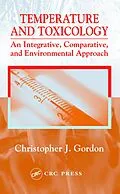This book explains the importance of temperature in toxicological studies, then reviews temperature regulation in homeotherms and poikilotherms, and addresses whole-animal and in vitro studies related to the effects of temperature on toxicity. The text examines thermoregulatory response to toxic insult, and describes hypothermic response in rodents to febrile and hyperthermic reactions in humans. It discusses the relevance of heat and cold stress on human exposures. This volume compares responses of animals, and focuses on endocrine disruption. It considers how toxicants and thermal stress cause the expression of stress proteins, and concludes with an examination of thermoregulatory response to natural toxins and venoms.
Zusammenfassung
Thermoregulation is vital for survival but the interplay between toxic insults and thermoregulatory mechanisms is often poorly understood. Temperature and Toxicology: An Integrative, Comparative, and Environmental Approach is the first major text to study the integrative thermoregulatory responses of mammals that are exposed to toxicants. Because e
Inhalt
Introduction. Principles of temperature regulation. Acute toxic thermoregulatory responses. Temperature effects on chemical toxicity. Regulated hypothermia: An adaptive response to toxic insult. Fever and hyperthermia. Environmental stress. Comparative physiological responses. Genetic variability and molecular markers. Toxins and venoms.
